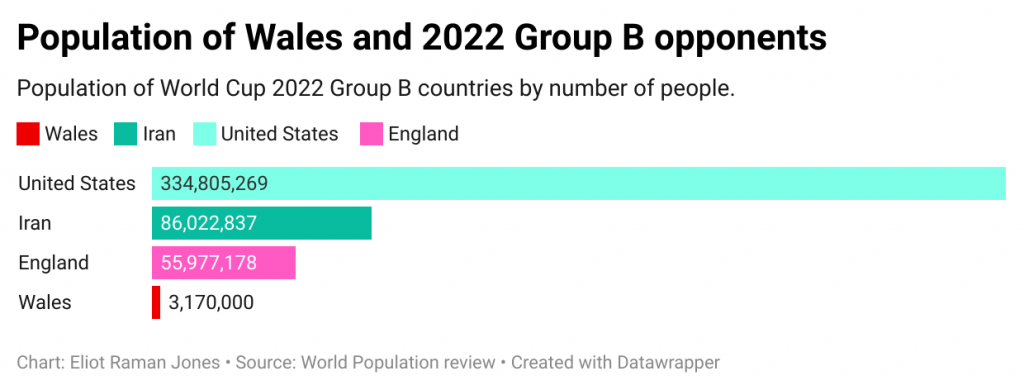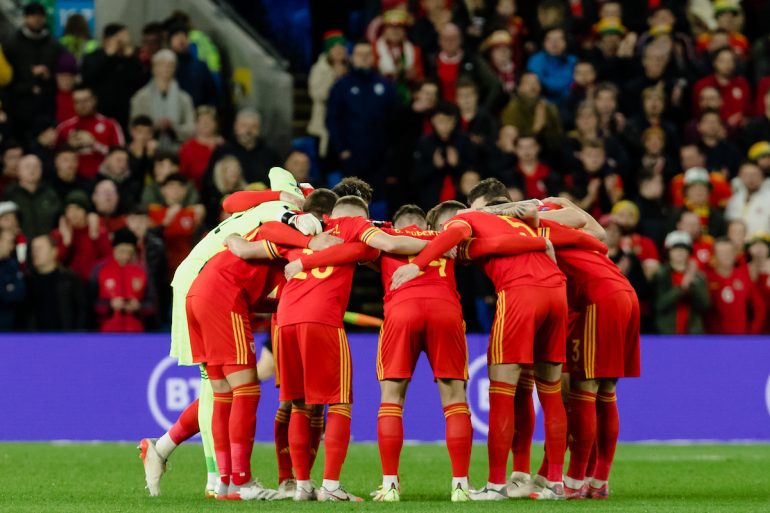Rob Page’s men have made it back to the World Cup after 64 years
On the 19th of June 2022, it will have been exactly 64 years since Wales crashed out of the quarter-finals of the 1958 World Cup after a battling display against eventual champions Brazil.
Since then, their opponents, who were at the time inspired by a 17-year-old Pele, have been present at every tournament, winning the trophy another four times. Wales have until recently languished in the lower tiers of the international rankings, but set their sights on a return to football’s greatest competition this year when they beat Ukraine to qualify for the 2022 World Cup.
When current World Cup hosts Qatar were chosen to host the 2022 World Cup in 2010, Wales were ranked 112th, below tiny island nations like the Faroes and Haiti.
A year later they dropped to 117th place.
Wales fan Gwern ab Arwel, 22, from Caenarfon, was overcome with emotion when Wales qualified for this year’s tournament.
“I’m over the moon. It’s been a long, long time since we’ve played on the biggest stage – and there’s been many disappointments in the last 64 years.
“Obviously I’m young compared to my father’s generation, who have had to endure some bleak performances and gutting results. But it’s incredibly nice to see Welsh flag being raised alongside some of the superpowers of world football.”
To achieve World Cup qualification and jump 99 places to 18th in the world in just 12 years is incredible, but now that they’ve achieved the impossible, where does the Welsh team go from here?
The Climate
Wales’ last World Cup was the first to be played in a Nordic country in Sweden, and this year represents another milestone for the World Cup – it is the first to be played in an Arab nation.
When the tiny nation of Qatar was first selected to host the World Cup, it was expected that it would follow the same formula as other countries and host during the summer months, but the climate proved that to be an impossibility.
Temperatures in Doha, the capital of Qatar, in the summer regularly approach 41 degrees centigrade, and have been known to peak at 50 degrees on particularly warm days, so FIFA moved the World Cup to the winter, where temperatures approach a more modest but still hot 30 degrees.
Gwilym Boore, co-owner of Gol 5-a-side centre in Cardiff, has had experience of the Qatar climate as a Wales fan.
“Back in 2000 Wales played a friendly in Qatar – it was in February and the weather was nice enough. The heat wasn’t excruciatingly bad, and people yearn for winter sun like that,” he said.
Qatar has come under fire since the construction of the stadia began for alleged mistreatment of migrant workers, as well as failure to adequately protect them from the hot climate.
“It’s absolutely appalling, all of us profess to care about human rights but we are going to Qatar – I’m not celebrating going to Qatar, I’m celebrating going to support Wales,” said Gwilym.
“It’s a repressive regime. Russia shouldn’t have hosted the World Cup, and now FIFA have awarded their premier tournament to two repressive regimes in a row.
“The thing is that the Dutch are only taking 500 fans, but it’s easy enough to be principled when you qualify for the World Cup every four years,” said Gwilym.
Wales fans making the trek to Qatar in November should be advised that while it is still 20 degrees cooler in the winter, the Arab nation’s climate is still comparable to a hot Welsh summer.
The Tickets
One of the consequences of hosting the World Cup in such a small nation is that with a limited capacity of possible visitors, the demand for tickets has skyrocketed.
Because Wales qualified late for the finals in Qatar due to the play-offs, many fans have not had a chance to buy tickets as early as fans of other nations in the tournament that sealed qualification earlier.
While some tickets have been held back by FIFA, many Wales fans feel this number is too low.
“Naturally, it’s a difficult process and likely to be expensive for us. It seems as if FIFA have kept back tickets for the late qualifiers, but they have only allocated 2,500 tickets to the fans – which is a shame,” said Gwern.
‘”It seems as if many travel agents have received a wad of tickets for travel packages, but that is going to mean that you cannot buy your own flights, hotels and so on.
“We would prefer to go to alternative destinations, such as Dubai or Riyadh to guarantee accommodations, and then take shuttle flights over for the games.”
FIFA have only allocated 2,500 tickets to the fans – which is a shame
Gwern ab Arwel
The Stadia
However, when some Wales fans make it to Qatar, they will find the travel times between stadia and training camps within Qatar has been drastically reduced from previous tournaments.
As the 37th smallest nation in the world, and with all of the stadia for the World Cup being located in and around the capital city of Doha, all eight venues are situated within a 21-mile radius of each other.
Wales will be playing their games at the Ahmad Bin Ali Stadium (in orange), a 40,000 capacity stadium 14 miles from Doha city centre.
The stadium, named after former emir of Qatar Ahmad bin Ali Al Thani, was constructed in 2003 and demolished in 2015 but has been rebuilt and repurposes for the 2022 World Cup.
When not hosting international matches, it is the home of Al-Rayyan SC, who play in the Qatar Stars League.
There is an unlikely connection between Al-Rayyan and Wales as former League Cup-winning Swansea manager Michael Laudrup also managed the Qatari side for two years, leaving in 2018.
The Competition
Wales’ win against Ukraine may have qualified them for the World Cup, but their group stage draw has placed the Dragons among giants, both in terms of size and sporting pedigree.

Robert Page’s men will have to contend with an England side who are fresh off the back of a second-place finish at last year’s European Championships, and who have history in the competition, winning their only World Cup in 1966.
Gregg Berhalter’s USA side qualified for the World Cup finals in Qatar with an unbeaten home record after missing out in 2018. Top players like Chelsea’s Christian Pulisic, Juventus’ Weston McKennie and Borussia Dortmund’s Gio Reyna came in to the team as they won the inaugural CONCACAF Nations League and the 2021 Gold Cup.
While Iran have qualified for the World Cup six times, they have never progressed past the group stages. They have had continental success in the form of three Asian Cup wins in the 1970s, and the recent move of talented winger Alireza Jahanbakhsh to European giants Feyenoord made him the most expensive Iranian player of all time.
Gwern believes despite the strength of the group, Wales are capable of a few shock results.
“With a fully fit side and with our best players, we could make it to the Round of 16 or even further,” he said.
“It’s likely that we’ll have to get four points to leave the group. Those will most likely come against USA or Iran given our standard. But we are confident, and perhaps some eyebrows will hopefully be raised against the old rival England.”
Gwilym believes that the Group will be difficult to navigate for Wales.
“Football’s a stupid game to predict. We’re punching above our weight being there, and none of the teams are football heavyweights apart from England,” he said.
“Someone is going to slip up against Iran because they don’t concede many and don’t score much, but the USA always make it through the group stage.”
Wales have not won a game against neighbours England since the 1984 British Home Championship, but the 1966 World Cup champions needed two late goals when the sides met in the 2016 European Championships to beat a Gareth Bale-inspired Wales side.
Wales have positive records against the United States and Iran, beating the former in 2003 and the latter back in 1978.
The Players
As Wales hope to upset the odds and progress as far as they can in Qatar, they will be relying on a team whose battling ways have seen them produce unlikely wins and strong performances in the qualifying stages, made up of a mix of seniority and young talent.
One of the ongoing stories of the summer is the destination of Wales’ all-time top scorer and captain Gareth Bale. Bale has been instrumental in getting his side to Qatar and has found fitness for international matches despite a lack of playing time with his now former club Real Madrid.
In order to continue to build up his fitness and be playing regularly by the time Wales go to Qatar in November, Bale needs a new club to train at, and whether that is a return to hometown Cardiff or not, a move will happen.
The World Cup has in the past seen talented players for their countries secure high-profile moves to much larger clubs, and Gwern believes that could be the future of some of the Wales players this year.
“It was unusual to see Bale and [Aaron] Ramsey play for big European teams [Real Madrid and Juventus] – something which hasn’t really happened since the days of John Charles [Juventus], our star in the 1958 World Cup.
“Maybe that will not happen again for a while, but I can definitely see the likes of Brennan Johnson [Nottingham Forest] or Harry Wilson [Fulham] getting moves to a club in the top six.
“Neco Williams [Liverpool] is another one who might be looking to break into his club’s first team regularly and will want to impress on the left,” said Gwern.
Whether the spotlight shines on an individual this year, Rob Page’s men have reached their first finals in over 60 years as a team, and whatever their future at the World Cup this year holds, nobody will be underestimating Wales.



